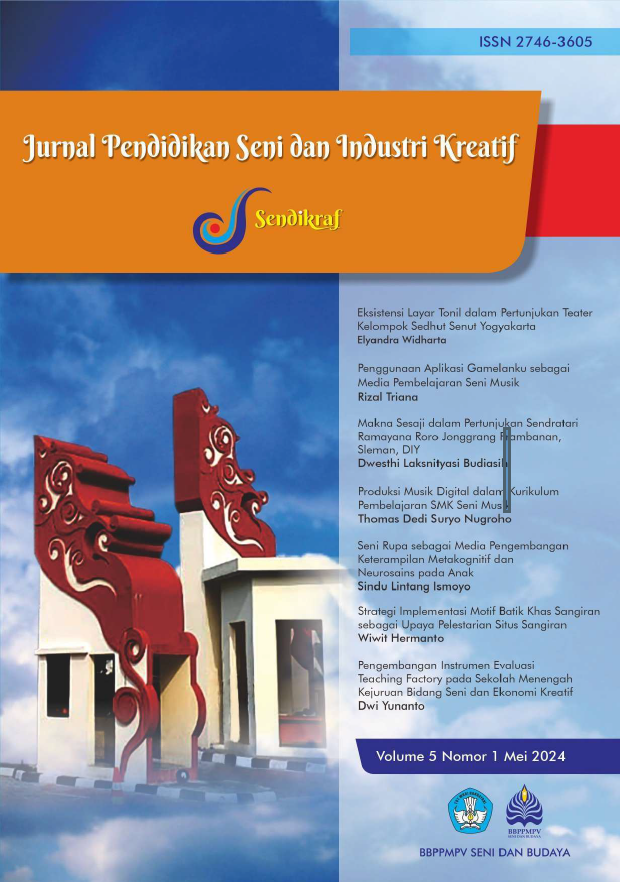PRODUKSI MUSIK DIGITAL DALAM KURIKULUM PEMBELAJARAN SMK SENI MUSIK DIGITAL MUSIC PRODUCTION IN THE CURRICULUM OF MUSIC VOCATIONAL HIGH SCHOOL
Isi Artikel Utama
Abstrak
The advancement of digital technology has permeated every aspect of life, including the field of music. Introducing digital music production in the curriculum of vocational high schools specializing in music is not just important anymore, but urgent. Mastery of basic digital music production aims not only to address the challenges of modern times but also to open up entrepreneurship opportunities for its graduates. With these skills, students can create music content for social media, build personal brands, and even create new business opportunities. Thus, the integration of digital music production into education is not only relevant but also essential in preparing the future generation for the digital era. This article aims to delve deeper into the fundamental aspects that underscore the importance of learning digital music production in the curriculum of vocational high schools specializing in music.
Perkembangan teknologi digital telah merambah ke seluruh aspek kehidupan, termasuk dalam bidang musik. Pengenalan produksi musik digital dalam kurikulum pendidikan SMK kompetensi seni musik bukan lagi hanya penting, namun mendesak. Penguasaan dasar produksi musik digital tidak hanya bertujuan menjawab tantangan perkembangan zaman, tetapi juga membuka peluang entrepreneurship bagi para lulusannya. Dengan keterampilan ini, siswa dapat menghasilkan konten musik untuk media sosial, membangun branding, dan bahkan menciptakan peluang bisnis baru. Dengan demikian, integrasi produksi musik digital dalam pendidikan tidak hanya relevan, tetapi juga esensial dalam menyiapkan generasi masa depan untuk era digital. Artikel ini bertujuan mengkaji lebih dalam aspek-aspek yang menjadi dasar pentingnya pembelajaran produksi musik digital dalam kurikulum pendidikan SMK kompetensi seni musik.
Rincian Artikel

Artikel ini berlisensi Creative Commons Attribution-NonCommercial 4.0 International License.
Referensi
Alexander Lerch. (2018). The Relation Between Music Technology and Music Industry. In: Bader, R. (eds) Springer Handbook of Systematic Musicology. Springer Handbooks. https://doi.org/10.1007/978-3- 662-55004-5_44
Born, G., & Devine, K. (2015). Music technology, gender, and class: Digitization, educational and social change in Britain. Twentieth-Century Music, 12(2), 135–172. https://doi.org/10.1017/S14785722150000 18
Camlin, D. A., & Lisboa, T. (2021). The digital ‘turn’ in music education (editorial). Music Education Research, 23(2), 129–138. https://doi.org/10.1080/14613808.2021.19 08792
Clauhs, M., Franco, B., & Cremata, R. (2019). Mixing It Up: Sound Recording and Music Production in School Music Programs. Music Educators Journal, 106(1), 55–63. https://doi.org/10.1177/002743211985608 5
Creswell, J. W. (2007). Qualitative Inquiry and Research Design : choosing among five approaches.
Krause, A. E., & North, A. C. (2016). Music listening in everyday life: Devices, selection methods, and digital technology. Psychology of Music, 44(1), 129–147. https://doi.org/10.1177/030573561455906 5
Mark M. (2017). Composing with the Digital Audio Workstation.

